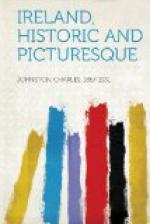The valor of Fergus and Cuculain, the rich imaginative life of Find and Ossin, were the flower of heroic centuries. Strong men had fought for generations before Concobar reigned at Emain of Maca. Poets had sung their deeds of valor, and the loves of fair women, and the magical beauty of the world, through hardly changing ages. The heroes of fame were but the best fruit in the garden of the nation’s life. So ripe was that life, more than two thousand years ago, that it is hard to say what they did not know, of the things which make for amenity and comity. The colors of the picture are everywhere rich, yet perfectly harmonized.
The earliest forms of Irish writing seem to have come from the Baltic runes, and these, in their turn, from an old Greek script of twenty-five hundred years ago. The runes spread as far as the Orkneys, and there they were well within the horizon of Ireland’s knowledge. Nothing would be more natural than the keeping of written records in Erin for three or four hundred years before Cuculain’s birth, nineteen hundred years ago.
The arts of life were very perfect; the gold-work of that time is unsurpassed—has never been surpassed. At a far earlier time there were beautifully moulded and decorated gold-bronze spears, that show what richness of feeling and imagination, what just taste and fine skill were there. All our knowledge goes to show that the suitor of Crede has drawn a true picture of her house and the generous social life belonging to it. We know, too, that the great dining-hall of Tara has been faithfully celebrated by the bards; the picture of the king in his scarlet cloak is representative of the whole epoch.
The story of Crede also shows the freedom and honor accorded to women, as does the queenship of Meave, with the record of her separate riches. The tragedies of Deirdre and Grania would never have been remembered, had not the freedom and high regard of women been universal. Such decorative skill as is shown in the metal-work and pottery that have come down to us must have borne fruit in every realm of social life, in embroideries, tapestries, well-designed and beautifully adorned homes. Music is everywhere spoken of in the old traditions, and the skill of the poets we can judge for ourselves.
In all that concerns the natural man, therefore, a very high perfection had been reached. A frame of life had grown habitual, which brought out the finest vigor and strength and beauty. Romantic love added its riches to valor, and dignity was given by the ever-present memory of the heroic past, merging on the horizon with the divine dawn of the world. Manhood and womanhood had come to perfect flower. The crown rested on the brow of the nation’s life.
When the life of the natural man is perfected, the time comes to strike the note of the immortal, to open the door of our real and enduring destiny. Sensual success, the ideal of unregenerate man, was perfectly realized in Concobar and ten thousand like him. The destiny of triumphant individual life, the strong man victorious over nature and other men, was fulfilled. Individual prowess, individual accomplishment, could go no further.




